Fuerza Latina: Stephanie Gabriela Lopez
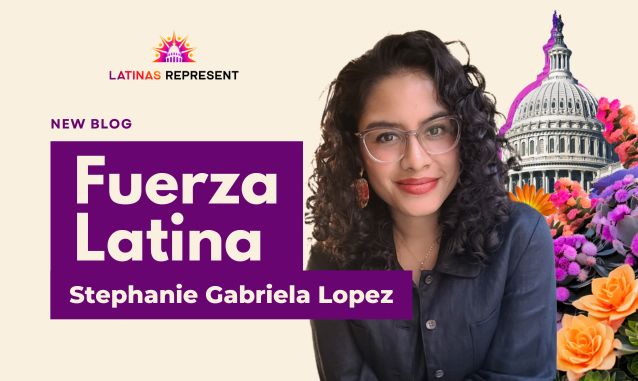
My fuerza is woven from the fabric of my family’s journey—immigrants who survived the Salvadoran civil war and persevered to create a better life. As their daughter, I carry with me their unwavering determination, sacrifices, and the deep sense of responsibility they passed down to me.
Fuerza Latina: Director Melanie Fontes Rainer
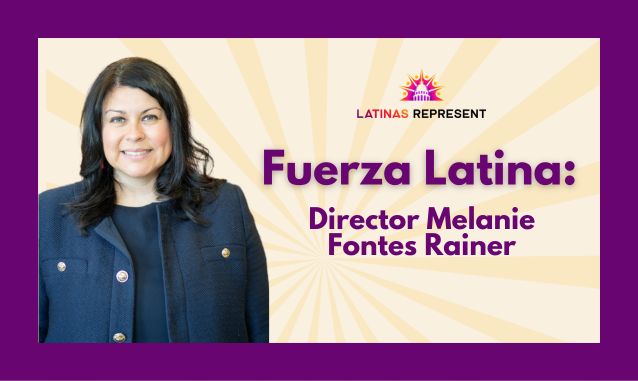
English: As part of our Fuerza Latina series, Latinas Represent is proud to feature inspiring stories of Latinas making a difference in public service. These stories shine a light on the impactful work being done at all levels of government by Latina leaders across the country. This month, we’re highlighting the journey of Melanie Fontes Rainer, Director of the Office for Civil Rights. Scroll to the bottom to read our blog in Spanish. Español: Como parte de nuestra serie Fuerza Latina, Latinas Represent se enorgullece destacar las historias inspiradoras de latinas en el servicio público. Estas historias iluminan el importante trabajo que líderes latinas están realizando en todos los niveles de gobierno en el país. Este mes, destacamos la trayectoria de Melanie Fontes Rainer, Directora de la Oficina de Derechos Civiles. Desplácese hacia abajo para leer nuestro blog en español. An American Fighting for Civil Rights Director Melanie Fontes Rainer leads the Office for Civil Rights (OCR) for the U.S. Department of Health and Human Services (HHS). She is a proud fifth-generation Latina and Arizonan who is at the forefront of the fight for civil rights, working to ensure that the civil liberties of all Americans are protected while seeking health and human services. Raised by a single mom, Director Fontes Rainer earned her bachelor’s and law degrees from the University of Arizona and her master’s degree from the City University of New York, Brooklyn College. Before being appointed to lead the OCR under the Biden-Harris Administration, she served as the Special Assistant to the Attorney General and Chief Health Care Advisor at the California Department of Justice, America’s second-largest justice department. She led a national team to save the Affordable Care Act and protect healthcare coverage for over 133 million Americans. Director Fontes Rainer’s commitment to reproductive justice and…
Why I Vote | Isabella Diaz
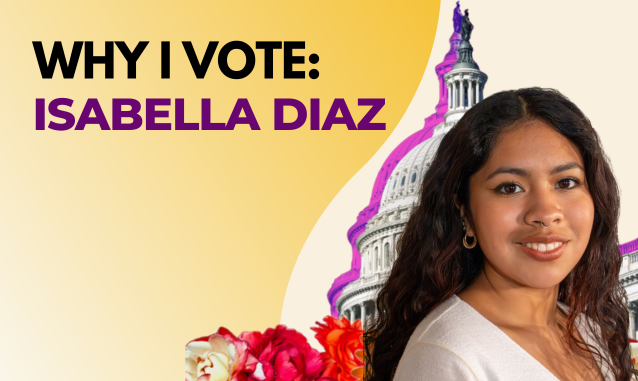
As a Latina first-generation student from New York City, I have had incredible opportunities in my life due to my geographical location. For instance, I was able to: Become a community organizer for United We Dream (UWD). Be a part of leadership spaces created for the Latine community. Learn from Latine peer mentors and faculty. Feel a greater sense of belonging. These opportunities have been mine because of my community’s support, love, and hard work. I owe it to my community to give back to them. This is why I fight for our rights at UWD actions, mentor younger Latine peers, and program event spaces for Latine people at my university. These moments are the essence of my identity. The care I receive and give to my community empowers me to do my best to help all Latine people succeed. As a public health major, I want to help our community be healthier so that more Latine people can have the power to make change. This is why I take charge of learning about issues most impacting my community: the formulation of the Zero Tolerance Policy, diabetes, and health literacy among older people in our community, the effects of health insurance policies, maternal stress, youth obesity rates, etc. My passion for these issues is inspired by the 1960s Young Lords, a Puerto Rican-led movement concerned with women’s rights and community health. They created sustainable health change by promoting health care, childcare services, and meals for the community. My favorite story is when the Young Lords “liberated” a truck for the barrio when the city refused to do tuberculosis testing. They even took over a hospital for a day in July 1970 to demand a new hospital and preventative health care programs be built in the South Bronx.…
Why I Vote | Karla Bobadilla
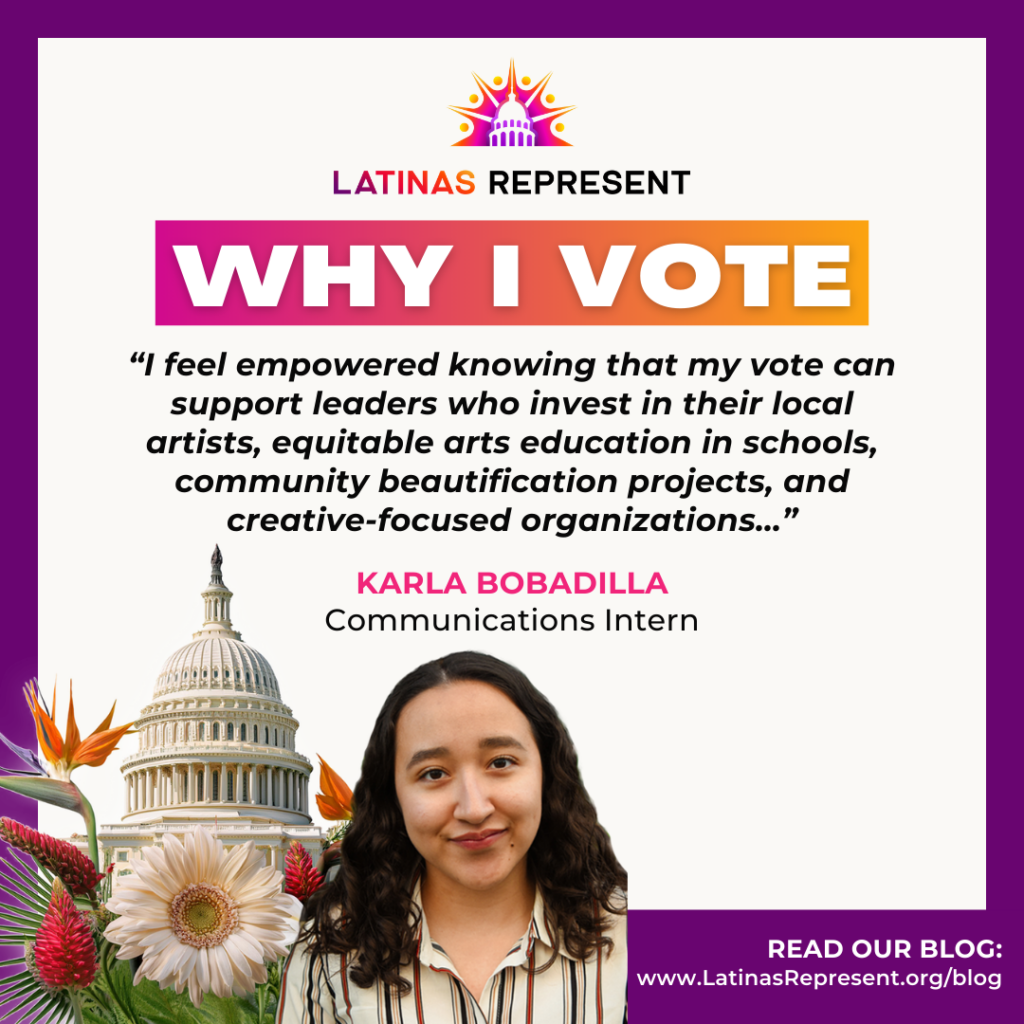
I vote because I want to use my privilege of being able to vote for good– to enrich my future and community. It is wild to think that many years ago, women were not allowed to vote, let alone women of color. Every time I vote, I think about that struggle, its impact on my life, and how my vote will shape the future of those around me. Voting is a privilege not accessible to everyone, and unfortunately, those who do have this privilege often waste it, mainly due to a lack of self-awareness or understanding of its significance. When I turned 18, I was excited to register to vote. I was eager to participate in the local elections and presidential primaries in 2019, even though I did not fully grasp the weight of my vote. Then came the 2020 presidential election. As the social and political climate changed rapidly, I had an “aha” moment, realizing the lack of representation of women of color and Latinas in political offices. It was both disappointing and eye-opening. While we’ve made progress, we still have a long way to go. During the pandemic’s peak in November 2020, my sister and I were commissioned to paint a utility box mural for a neighboring city. Councilwoman Monica Rodriguez from LA County, District 7, collaborated with 11:11 Projects, an arts nonprofit organization, to beautify Pacoima with art on utility boxes, enhancing the community. We worked along the famous Pacoima Mural Mile, close to Pacoima City Hall. Meeting Councilwoman Rodriguez and the founders of 11:11 Projects was inspiring. They were powerful women doing great things for their communities, and their dedication fueled my passion for social impact and design. This experience guided me into numerous opportunities working with nonprofit organizations, where I could contribute my design skills…
Fuerza Latina: Andrea Gonzalez

Gen Z Latinas are stepping into the political arena with a passion and purpose that reflect their diverse experiences and aspirations. As the largest generation in the U.S., they wield significant influence, and their voices are crucial in shaping the future. With a deep understanding of the challenges their communities face—such as immigration, education, and healthcare—these young women are advocating for change and harnessing the power of voting to amplify their impact. By participating in elections, Gen Z Latinas are challenging the status quo, breaking barriers, and ensuring that their perspectives are represented in decision-making that affects their lives and those of future generations. “Gen. Z is not lazy, but rather, we are proactive in seeking change and are willing to show up and vote.” Said Gonzalez. This is why we wanted to highlight the work of Andrea Gonzalez, a young Latina based in Southern California who is producing an event this week to highlight the importance of Gen Z Latinas getting involved in the electoral process by encouraging the community to get involved and get out the vote. “I hope for young Latinas to become more involved in politics and challenge gender norms,” says Gonzalez, a second-generation American and first-generation college graduate. She explains a clear need for more representation in political positions, particularly for Latinas. She believes we must actively work to fill this gap in representation by harnessing the power of education, as education is the most important factor for personal and societal growth. Join Andrea and others at the Fuerza Latina: GenZ Voting Empowerment Summit on Thursday, September 26, at 5:30 pm PST at Heritage High School for a day filled with inspiring speakers, interactive workshops, and opportunities to learn about the power of your vote. This event is free but requires registration via the Eventbrite…
My Journey as a Latina Poll Worker
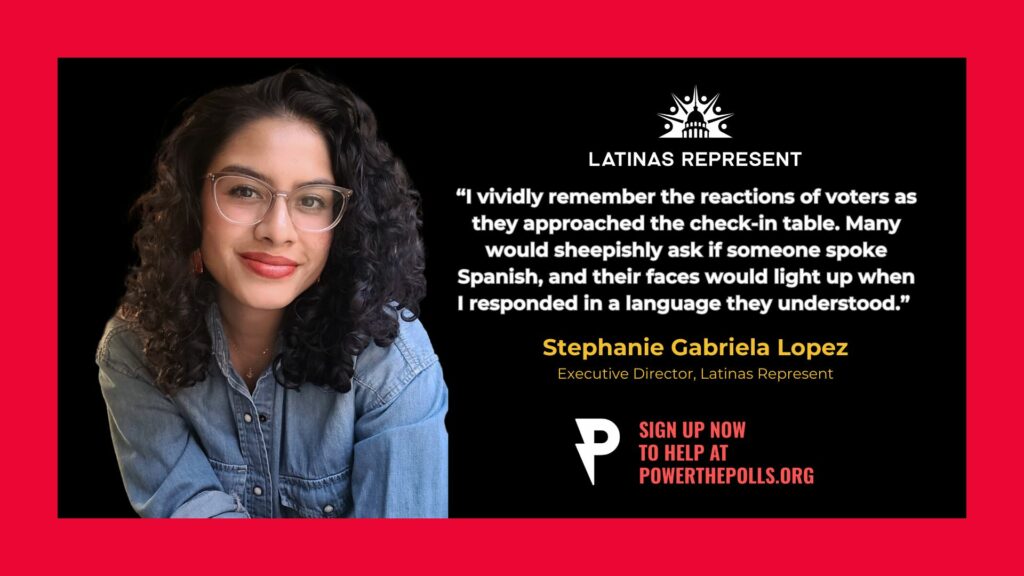
Training day arrived a few days before the election. Although I had accompanied my dad to the polls every election since I was a child, I had no idea what it would be like to serve as a poll worker. During the training, we were given a rundown of how to set up the polling station, greet voters, process votes, and operate the machines. I also met the other poll workers—some were newbies like me, and others had been doing this work for years. We were a team of retirees, veterans, teachers, students, union workers, and neighbors coming together to help voters navigate the election process. I was assigned to a predominantly Latine, bilingual voting precinct, and despite this, I was the only Spanish-speaking poll worker on my team. What began as a practical way to earn some extra money during college quickly evolved into something far more meaningful—not just for me, but for the voters I served. Throughout that first election, I vividly remember the reactions of voters as they approached the check-in table. Many would sheepishly ask if someone spoke Spanish, and their faces would light up when I responded in a language they understood. Seeing them gain confidence and feel like they belonged at the polls was incredibly rewarding. It was clear that my presence made a difference, and these experiences left a lasting impression on me, which is why I continued to serve as a poll worker for the remainder of college. It didn’t dawn on me at the time that my presence was part of a bigger movement toward more inclusive representation at the polls. The reality is that poll workers have historically been older and predominantly white—around 75% are over the age of 60. This lack of diversity can create barriers for voters from…
Introducing our Interns: Karla Bobadilla & Isabella Diaz
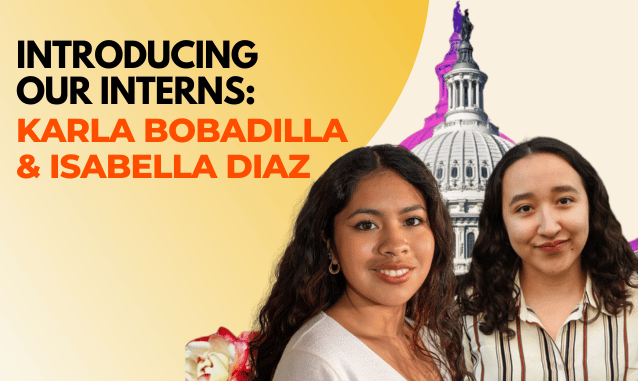
We are thankful our summer interns are part of our team! We aim to provide young Latinas with an opportunity to learn more about how they can serve in public service and how to support those who wish to run for elected office. Take a few minutes to learn more about our communications intern, Karla Bobadilla, and research intern, Isabella Diaz. Q: What inspired you to join Latinas Represent, and what are you most excited to learn or achieve during your internship? Karla: I joined Latinas Represent to support their mission of uplifting Latina changemakers in politics, recognizing the need for greater diversity. I’m eager to learn more about politics and contribute to a politically focused non-profit. Additionally, I look forward to using my visual communication design skills to contribute to their social media and marketing. Isabella: I was inspired to join Latinas Represent because of its mission to support Latinas running for public office. Latinas are not monolithic; we are diverse and unique in our voice. I am excited to research all Latina candidates and investigate the change they want to create for their communities. It is empowering to see how Latinas in public office may influence other Latinas through power, mobilization, and political participation. Since completing Dr. Ali Valenzuela’s class Latinos in U.S. Politics, I have been greatly intrigued to learn more about the power and influence the “Latino vote” has on our society. My goal with Latinas Represent is to help inspire our Latina community to see this happen. Q: How has your cultural background influenced your choice of major and career aspirations? Karla: My vibrant Latine community has always inspired my creativity and passion for art. This led me to pursue a degree in Communication Design, where I can merge creativity with purpose. I am excited…
Celebrating Latinas in Politics: ‘Running with My Girls’ Conversation
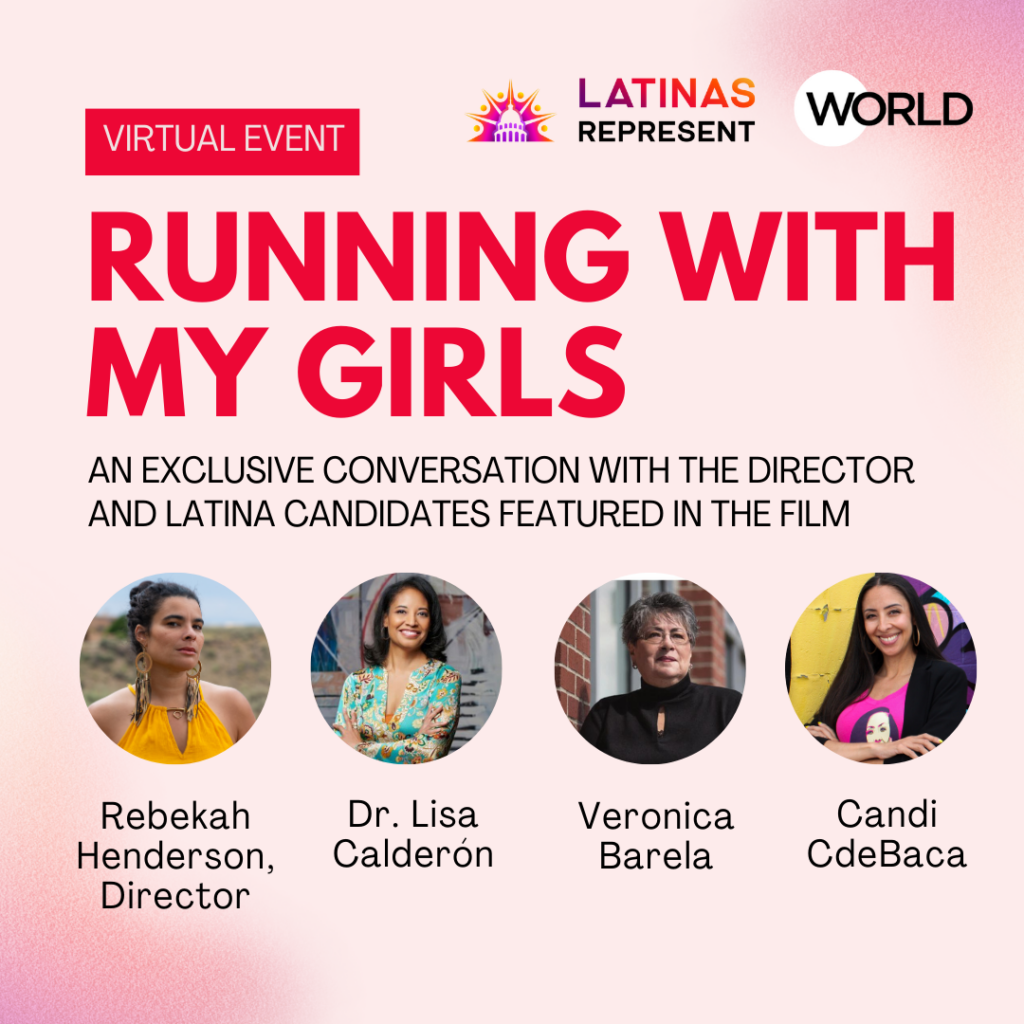
https://youtu.be/uJ9ggMnBunI Our “Running with My Girls” exclusive screening conversation hosted in partnership with World Channel brought together the filmmaker, Rebekah Henderson, and a powerhouse lineup of former Latina candidates featured in the film, Candi CdeBaca, Veronica Barela, and Dr. Lisa Calderón, who shared their raw, real stories of running for local office. The Zoom room was buzzing with energy as we delved into the journeys of these incredible women. From the highs of victory to the lows of facing down barriers, every moment was a testament to the courage and grit of Latina leaders in politics. But they didn’t just talk about the challenges—our speakers also shared the love, laughter, and unwavering support that fuels their passion for public service. There’s something magical about seeing Latinas lift each other up, reminding us that when one of us shines, we all shine brighter. And let’s talk about the advice they dished out! It was a masterclass in political empowerment. They dropped gems left and right, leaving us feeling ready to take on the world. One of the key highlights of the conversation was the genuine camaraderie and support among the speakers. As they recounted their experiences on the campaign trail, they emphasized the importance of solidarity and collaboration within their communities. Their collective passion for advocacy and public service served as a powerful reminder of the impact that Latinas can have in shaping their communities and driving positive change. The speakers also offered practical advice and encouragement for Latinas who aspire to run for office, emphasizing the importance of authenticity, resilience, and community engagement. The “Running with My Girls” conversation wasn’t just about politics—it was a celebration of Latina powerhouses and a reminder of the incredible things we can achieve when we come together. So here’s to our past, present, and future Latina…
Behind the Scenes: My Journey on the Esperanza United Policy Advisory Council
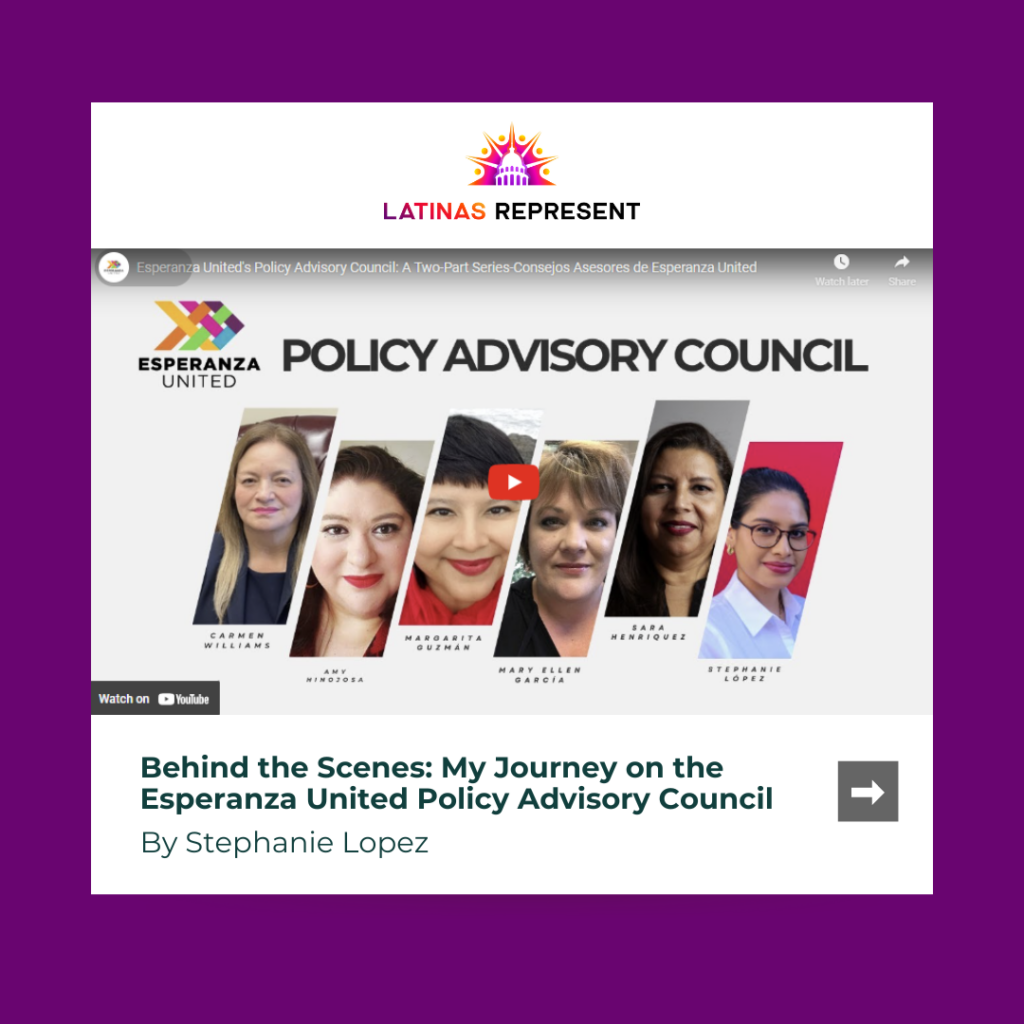
As the Executive Director of Latinas Represent, I’ve dedicated my career to amplifying the voices of Latinas in all spheres of society. And guess what? I’m thrilled to let you in on a little secret – I’m also part of something truly special: Esperanza United’s Policy Advisory Council.
Latina Environmentalists You Should Know
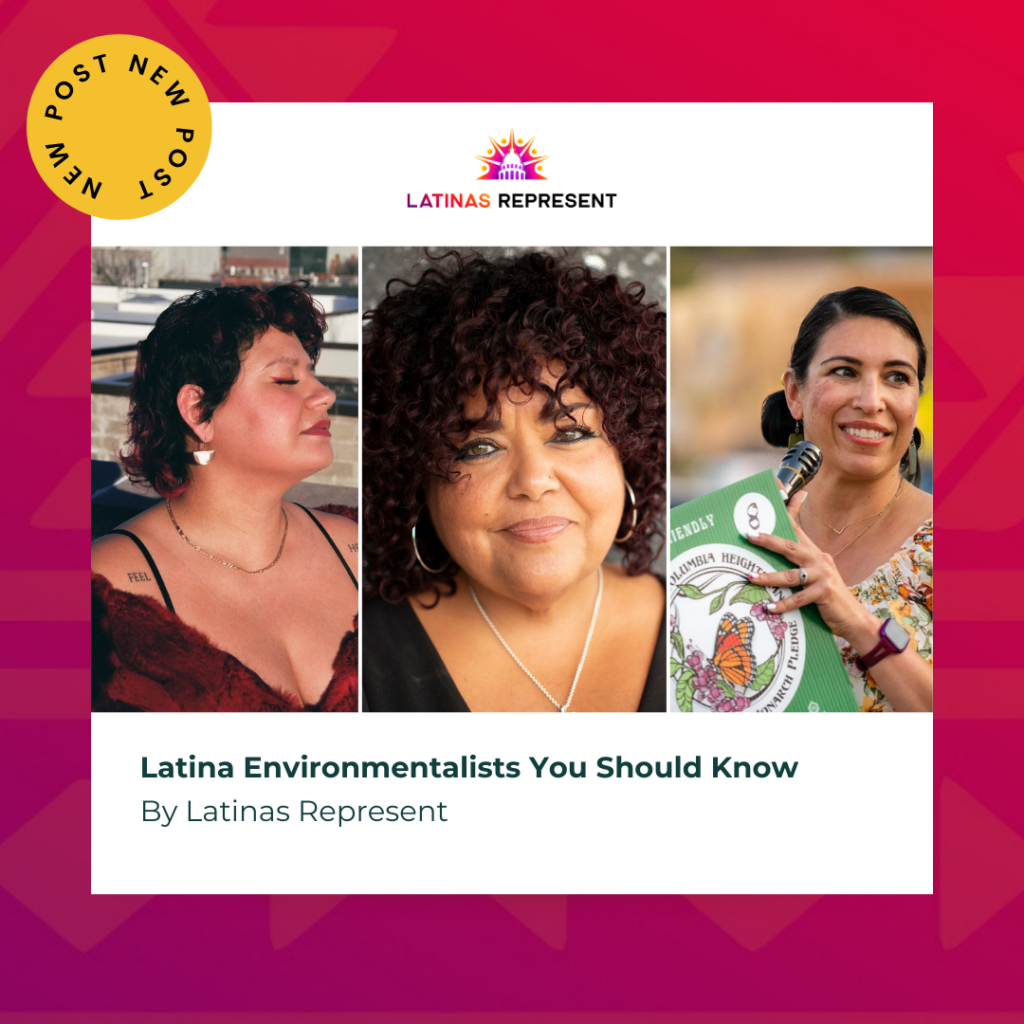
We honor and celebrate the work of individuals working to protect and heal the environment with actions big and small.